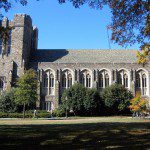DAVID: Let's give readers an example of what they'll find. One idea you describe in the book is a worship service that features the long genealogy of Jesus from the gospel of Matthew. This is a passage of scripture most people skip over. It's a list of names from many generations. But you describe a liturgy -- and you even quote portions of it -- in which something surprising happens when the handful of women's names show up in that list of generations. When a woman's name pops up in the reading, a woman somewhere in the congregation actually gets up and reads a short piece about the importance of the woman listed by Matthew. I can imagine that it's startling to have people jump up like that during a scripture reading.
JOHN: The witness of women in scripture has been silenced or patronized by a church in which men primarily choose the readings for worship and who preach. In this genealogy of Jesus, four women are mentioned -- and these four women have rather unusual histories. Two of them had been prostitutes. When people hear more about figures like this, they realize that the Christ we are asked to follow does not come to us with a pristine pedigree. His very genes have the same taint we all have -- a mixed background. We need to help people make a much more personal and immediate connection with Christ, so that we don't leave Jesus simply as this baby who never cried in his mother's arms and then suddenly was catapulted from that scene onto the cross. No, that is not the humanity of Jesus. Jesus comes to us and lives with us and this tainted genealogy is a part of his spiritual armor.
DAVID: Here's another example from your book. This is jumping ahead to Christmas time. Probably every Christian church in the world has some kind of Nativity story or play or pageant -- often involving children portraying the parts. In your book, you describe standing up before such a play begins and asking the people sitting in the pews a few questions. You ask them to stand up if they've ever played a shepherd? Then, all the former angels stand. Then innkeepers. And so on. Why do you do that?
JOHN: The first time I did it was in the Episcopal cathedral here in Glasgow. It was partly because I knew that, as always on Christmas eve, there were a whole lot of people who have never been in church over the past year. But, nearly all these people who do show up have an investment in Christmas because, when they were children either in school or in church they enacted this play and they were shepherds or played some other role. Asking people to identify themselves like that is a way to gather the experience of the people together and to begin to use that familiarity to bring them to a deeper level.
DAVID: One of the great American evangelists, these days, has the same last name as yours: Rob Bell. He's not related to you. But especially in his new "world tour," he travels around and delivers this very creative, multimedia sermon. Halfway through his talk, Rob also asks people to stand up and identify things about their lives. He does this in a very welcoming way and I've seen people really moved by the experience. The fresh idea here is: People in the seats aren't just a passive audience, right? For years in America, "seeker churches" tried to make people in the seats feel that they could come, sit back, feel comfortable -- and they really didn't have to do anything. You and Rob Bell both are talking about a completely different approach to Christian community.
JOHN: Every month in Glasgow, we offer a liturgy we call Holy City. It's a time of experiment. We never have anyone preaching but we do always have people bringing the word of God to each other. We might ask people a question like Rob Bell asks. Or we might ask people to turn to each other and talk about a question like: How has the image of angels changed in your life over the years? And we actually trust people to open the scripture to each other. For example, if we're talking about concerns like cancer, we might take one of the miracle stories from scripture and marry this miracle story with a question about health as people have experienced this. We need to find opportunities where people can open up to each other and share their insights from their own lives and from scripture. We are no longer dealing with an illiterate congregation that needs to be a silent audience simply waiting for pearls to fall from the lips of a preacher. Now, there is no substitute for worship and for the proclamation of the word in preaching. I'm not talking about doing away with all of that. But we must also find ways to invite people to relate the scriptures to their own experiences, and then to share those insights with other people in community.
DAVID: I don't want to leave readers with some warm-and-fuzzy idea that when you use this word, "community," you're talking about a cozy circle of friends. In the new book, you write about how important it is to talk with strangers. That idea runs counter to what we usually teach people here in America: Don't talk to strangers! Especially in our cities -- we learn to walk fast and never stop to talk with people. You actually say: Stop! Talk! Meet someone completely outside the boundaries of your friends and neighbors. Your book is full of these conversations you've had yourself.




